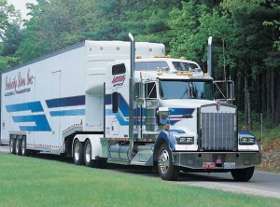Ticket In Canada
Topic 26120 | Page 1
First off - GET A LAWYER AND FIGHT THE TICKET. In fact - FIGHT EVERY TICKET. It could be the difference between driving/working and not.
Getting a citation for excessive speeding in a Commercial Vehicle (over 15MPH) is considered a SERIOUS OFFENSE. Get a second one within 3 years means losing your CDL for 60 days (a third time for 120 days).
Yes - your company puts it on your DAC report, but Canada has reciprocity - through whether or not it gets reported to your home licensing state remains to be seen.
EITHER WAY - a conviction will hang around and haunt you for awhile.
Rick
CDL:
Commercial Driver's License (CDL)
A CDL is required to drive any of the following vehicles:
- Any combination of vehicles with a gross combined weight rating (GCWR) of 26,001 or more pounds, providing the gross vehicle weight rating (GVWR) of the vehicle being towed is in excess of 10,000 pounds.
- Any single vehicle with a GVWR of 26,001 or more pounds, or any such vehicle towing another not in excess of 10,000 pounds.
- Any vehicle, regardless of size, designed to transport 16 or more persons, including the driver.
- Any vehicle required by federal regulations to be placarded while transporting hazardous materials.
DAC:
Drive-A-Check Report
A truck drivers DAC report will contain detailed information about their job history of the last 10 years as a CDL driver (as required by the DOT).
It may also contain your criminal history, drug test results, DOT infractions and accident history. The program is strictly voluntary from a company standpoint, but most of the medium-to-large carriers will participate.
Most trucking companies use DAC reports as part of their hiring and background check process. It is extremely important that drivers verify that the information contained in it is correct, and have it fixed if it's not.
My question is this: If Stanskye gets a local lawyer who is familiar with the local jurisdiction, can he get the speeding reduced to some non-moving violation?
My question is this: If Stanskye gets a local lawyer who is familiar with the local jurisdiction, can he get the speeding reduced to some non-moving violation?
Less than familiar with how things work in Canada. But for example - take it to trial, cop doesn't show - case dismissed. Judge opts to waive conviction (aka: withhold adjudication), no conviction on record.
Which is why it's always worth the $$ to hire a lawyer and fight - versus just laying down and paying the ticket and take the conviction.
Rick

I think you had the numbers wrong or did the math wrong or were really speeding in the low speed zone.
60 = 100 km 45 = 72 ( we have 80 not 72) 30 = 48 (we have 50 or 40)
Up here because it's KM no one goes the exact limit except you USA drivers, if it says 80 KM/h you can go 100 KM/h no ticket. Now in the 60 or 40 zones you can only go 5KM over or a ticket.
KM and Miles are very different.
Now if you were going 49 or 78KM/h in 30 or 50KM/H zone your done that's 30 KM/h over. 10 over 20 over no one cares anything over 20 KM/h over your a target.
Best advice is use this: https://www.xcopper.com they will get it dropper this is Canada after all don't worry.
The zone changed from 60 to 45 in the middle of the grade and to 30 at the bottom. The load was heavy and I was doing about 49 when I got to the bottom. There was a peace officer right there so I got a ticket.
You really need to watch your speed and be in more control of your truck. What if it had been a stopped car? You would have crushed it and probably be in jail right now.
Remember you can go down hill too fast but there is no such thing as too slow.
New Reply:
New! Check out our help videos for a better understanding of our forum features

















Preview:








 TT On Facebook
TT On Facebook
My mentor’s route went into Canada. I was going down a steep but short grade and he was sleeping in the back. The zone changed from 60 to 45 in the middle of the grade and to 30 at the bottom. The load was heavy and I was doing about 49 when I got to the bottom. There was a peace officer right there so I got a ticket.
This was only my second week of training and it looks like it’s going to hurt me for years now. Is it possible that a ticket in Canada won’t even show up on my record? Or is the company training me the one that reports it so it goes on my DAC?
DAC:
Drive-A-Check Report
A truck drivers DAC report will contain detailed information about their job history of the last 10 years as a CDL driver (as required by the DOT).
It may also contain your criminal history, drug test results, DOT infractions and accident history. The program is strictly voluntary from a company standpoint, but most of the medium-to-large carriers will participate.
Most trucking companies use DAC reports as part of their hiring and background check process. It is extremely important that drivers verify that the information contained in it is correct, and have it fixed if it's not.